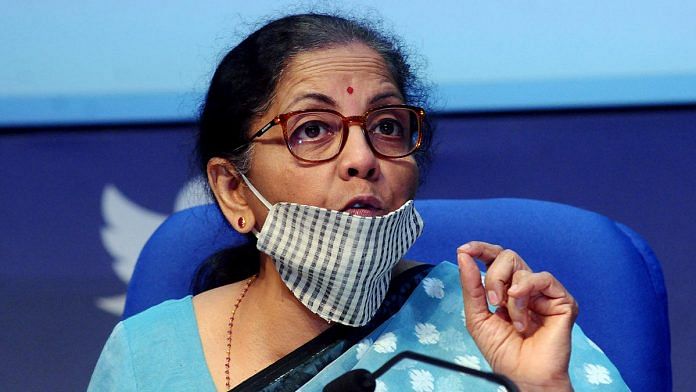New Delhi: The support measures worth Rs 6 lakh crore announced by Finance Minister Nirmala Sitharaman Wednesday for different sectors of the economy will lead to an impact of only around Rs 20,000-50,000 crore on the fiscal deficit, according to economists.
Sitharaman announced a slew of measures to facilitate credit flow to sectors like micro, small and medium enterprises, non-banking finance companies and housing finance companies, as well as increasing the cash-in-hand for organised sector workers and employers as part of the Rs 20-lakh crore economic package announced by Prime Minister Narendra Modi.
However, economists said most of the measures announced to battle the economic impact of the Covid-19 pandemic are for either encouraging bank lending to specific sectors, or for providing more liquidity to firms and individuals, and the impact on the fiscal deficit may be negligible.
Thanks to a sharp rise in expenditure and a squeeze in tax revenues, the government is faced with a massive funds shortage, forcing it to borrow 50 per cent more than what it initially budgeted for from the markets.
The government and the Reserve Bank of India together have announced measures adding up to Rs 13 lakh crore if one includes the Rs 5.2 crore liquidity infusion measures announced by the RBI, the fiscal package of Rs 1.7 lakh crore announced in March, and the Rs 6 lakh crore worth of measures Sitharaman revealed Wednesday.
Also read: Rs 20 lakh cr stimulus package vaults Sensex by 637 points, Nifty by 187
What will impact this year and what won’t
The steps announced that are likely to have a direct fiscal impact in the current year include:
– The Rs 4,000 crore government contribution to the credit guarantee trust for micro and small enterprises for facilitating loans to MSMEs
– The Rs 2,500 crore government contribution to the Employee Provident Fund on behalf of employers and employees
– The extent of the government equity participation in setting up the Rs 10,000 crore fund of funds for financing the growth capital of MSMEs.
Other measures like providing a Rs 30,000 crore special liquidity window for non-banking finance companies, micro finance institutions and the partial credit guarantee for these enterprises will translate into a fiscal hit only if there are defaults from these firms.
The fiscal impact of the Rs 3 lakh crore collateral-free loans for MSMEs announced by Sitharaman will again be felt in case of defaults by these firms. But given that there will be a one-year moratorium on interest and the principal amounts, the fiscal hit will only be realised beginning next year.
Experts’ take
D.K. Srivastava, chief policy adviser at EY India, said the measures announced Wednesday account for nearly 30 per cent of the Rs 20 lakh crore economic package, but the direct cost to the exchequer may be minimal.
“This package is based largely on credit guarantee provisions, implying minimal direct cost for the central exchequer, which may be just a small fraction of today’s package. Any additional cost would only be on account of defaults, the burden of which may arise only in future years. In the case of the power sector, the burden of bearing the default is in fact, on the state governments,” Srivastava said.
Former finance secretary Subhash Chandra Garg concurred.
“Any liability to the government from the collateral-free loans to MSMEs will depend on whether these turn non-performing. But with the one-year moratorium, the impact will not be felt this year,” Garg said, adding that most of the other announcements don’t have any direct fiscal implications.
Rahul Bajoria, chief India economist at Barclays, added in a note: “The impact on the fiscal deficit will likely be smaller than the headline figures announced by the government, and by our calculations, today’s measures will take up INR555bn (Rs 55,500 crore) of total fiscal spending on balance sheet.”
However, N.R. Bhanumurthy, professor at the National Institute of Public Finance and Policy, said while the direct impact on the fiscal deficit may be limited, there will be an indirect impact.
“Public sector banks will need to be capitalised by the government as they are going to bear the brunt of the announcements. This will also lead to a lower dividend payout by them,” Bhanumurthy said.
Also read: With Modi saying ‘self-reliance’ 17 times in speech, India seems set to turn protectionist




We want link by giving money for white ration card from modi
Using “Fiscal damage” in the headline. Typical The Print….. create alarm and somehow criticize the Govt.
Bad journalism.